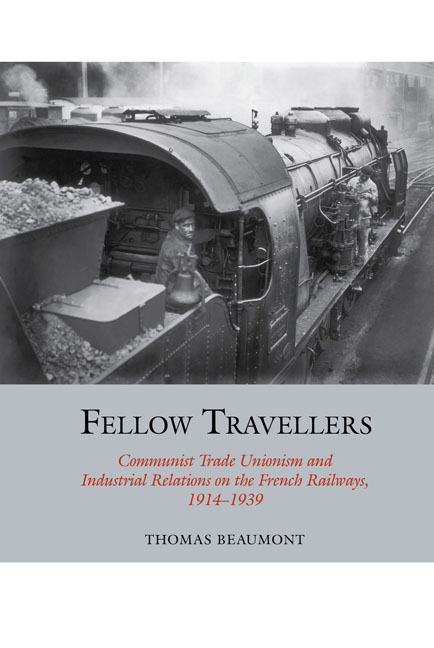 Fellow Travellers
Fellow Travellers Book contents
- Frontmatter
- Contents
- Acknowledgements
- Introduction
- 1 Railway Workers at War
- 2 Railway Workers and the ‘Après Guerre’
- 3 Railway Workers and the Communist Choice
- 4 Stabilisation
- 5 International Connections
- 6 ‘Hostile Participants’: Communists and Railway Industrial
- 7 Railway Workers and the Popular Front: From Victory to Defeat, 1934–1939
- Conclusion
- Bibliography
- Index
6 - ‘Hostile Participants’: Communists and Railway Industrial
- Frontmatter
- Contents
- Acknowledgements
- Introduction
- 1 Railway Workers at War
- 2 Railway Workers and the ‘Après Guerre’
- 3 Railway Workers and the Communist Choice
- 4 Stabilisation
- 5 International Connections
- 6 ‘Hostile Participants’: Communists and Railway Industrial
- 7 Railway Workers and the Popular Front: From Victory to Defeat, 1934–1939
- Conclusion
- Bibliography
- Index
Summary
Between 1928 and 1934 communist strategy on the railways underwent a series of major upheavals. Chief among these was a startling about-face on the issue of participation in railway industrial relations. Previously, the communist-led FNCU, following the revolutionary logic of communists as an oppositional force on the railways, had refused to endorse any activity reminiscent of wartime collaboration and the ‘reformism’ pursued by their rivals in the CGT union federation. From 1928, however, this approach changed as the communist-led union began a process of engagement with consultative managerial committees and, after 1931, played a leading role in railway safety delegations. Undertaken during the period in international communist history known as ‘class-against-class’, this strategy served to cement the communists’ position among the railway workforce as communist activists undertook an ever-greater engagement with the everyday realities, and concerns, of the cheminot workforce. In a period of deepening financial crisis on the railways, a product of the effects of the depression in France, such a strategy met with the support of significant numbers of railway workers who looked to the communist union to defend their working conditions against managerial attempts to enforce cost cutting measures. As such, rather than serving to weaken communist trade union organisation, the period known as ‘class-against-class’ in fact saw a significant extension of communist support on the railways. What is more, the practices learnt and experience gained from this ‘hostile participation’ in railway industrial relations would stand the FNCU in good stead when, in June 1936, the Popular Front government brought a greater degree of democracy into French industrial relations and instituted elected worker representation in workplaces across the French economy. Drawing upon the lessons of this earlier period, railway union militants would be ready to exert their authority in the new industrial relations landscape of the Popular Front.
Workers and the Depression
The French economy seemed at first to be insulated from the impact of the economic crisis that was sweeping through the industrial nations. While American and German economic performance declined precipitously from June 1929, it was another 12 months before the depression began to be felt in France. Even then the impact of the global economic crisis was shallow compared to the damage wrought in other western nations. While industrial output in Britain, America and Germany declined by more than 25% in 1931, France registered only a corresponding 10% drop in output.
- Type
- Chapter
- Information
- Fellow TravellersCommunist Trade Unionism and Industrial Relations on the French Railways, 1914–1939, pp. 161 - 202Publisher: Liverpool University PressPrint publication year: 2019


